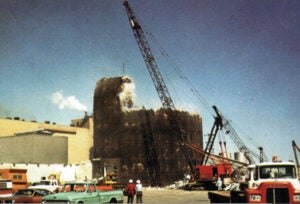On Friday, following passage of a bill to delay Environmental Protection Agency (EPA)–promulgated Boiler MACT rules, the U.S. House of Representatives also passed the Coal Residuals Reuse and Management Act (H.R. 2273), legislation that would impede the federal agency from proceeding with its May 2010 proposed rule to regulate coal ash residuals.
The legislation, whose sponsor, Rep. David B. McKinley, P.E. (R-W.V.), called it a “jobs bill,” requires states—as opposed to the EPA—to create plans to manage coal ash and empowers them to enforce them. It also prohibits the EPA from classifying coal ash residuals as hazardous waste.
The bill passed 267-144 in the House on Friday with 37 Democrats approving the measure. Five Democratic amendments were voted down.
According to the EPA, coal combustion residuals—or coal ash—are exempt wastes under an amendment to the Resource Conservation and Recovery Act (RCRA). “Potential environmental concerns from coal ash pertain to pollution from impoundment and landfills leaching into ground water and structural failures of impoundments, like that which occurred at the Tennessee Valley Authority’s plant in Kingston, Tenn.,” the agency said. The EPA pushed for national management of coal ash after the December 2008 coal ash spill from that surface impoundment near Kingston, which flooded more than 300 acres of land and flowed into the Emory and Clinch rivers.
Coal ash is produced in nearly 700 coal-fired power plants in 48 states, McKinley noted on the floor on Friday. “Approximately 140 million tons are produced annually with 40% of that coal ash being beneficially recycled. Over the years, scientists and entrepreneurs have found uses for coal ash through a variety of recycling options. Businesses were emboldened to recycle the material after two studies by the EPA in 1993 and in 2000 found that coal ash is not a hazardous material and could be used by the public. The findings of these two studies specifically state that there have been no documented cases of coal ash damaging human health or the environment.”
McKinley concluded by saying, “This is a jobs bill and a public health bill; protecting the livelihoods and the health of our working men and women are not mutually exclusive ideas.” McKinley said that a Veritas study had found the bill could protect up to 316,000 jobs from being eliminated.
The bill now goes to the Senate, where 14 Democrats have expressed support for a companion measure. The Obama administration said it opposes the bill, though it has not explicitly threatened to veto the measure.
Sources: POWERnews, Rep. McKinley, EPA








